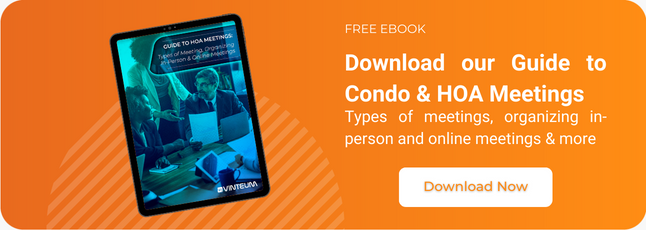
Knowing when an HOA executive session is necessary and making sure you follow the right rules can be challenging.These closed-door sessions are important, but it’s crucial to understand when and how to have them. This article is here to help you understand HOA executive sessions better. We’ll provide you with tips and information you need to collaborate more effectively with your board.
What is an HOA Executive Session?
An HOA executive session is a private meeting typically reserved for board members. Other individuals like an HOA manager or HOA attorney may also attend. Unlike regular HOA meetings, members cannot attend. This closed-door gathering serves as a secure space for discussing sensitive or confidential matters that impact the community. They typically discuss legal issues, contracts, personnel matters, and other sensitive topics.
However, not every state allows these closed-door meetings. Whether you can have them depends on your state’s laws and governing documents. In places where executive sessions are allowed, there are specific situations and rules to follow.
Why are HOA Executive Sessions necessary?
These private discussions allow board members to deliberate sensitive topics without compromising the privacy or security of the individuals involved.
They also serve a crucial role in ensuring legal compliance and risk mitigation. By convening in these sessions, board members can carefully examine legal matters, review contracts, and discuss potential litigation strategies. This proactive approach helps the HOA mitigate legal risks and maintain compliance with applicable laws and regulations.
Modern technology, such as HOA management platforms like Neigbrs by Vinteum Software, can streamline compliance by securely storing legal documents, tracking deadlines, and ensuring sensitive discussions remain confidential. These tools help boards maintain organized records of executive session decisions, reducing administrative burdens and minimizing errors

What topics can be discussed during an HOA Executive Session?
Here are some of the key topics that board members usually address during an HOA executive session:
- Legal Concerns: One of the primary reasons for convening an executive session is to discuss legal matters. This can include ongoing litigation, potential legal disputes, or compliance with local, state, or federal laws.
- Contractual Negotiations: The board can negotiate and review contracts with vendors, service providers, or contractors. These discussions often involve financial terms, service agreements, and other sensitive contract details.
- Personnel Matters: The board can discuss HOA staff, including hiring, performance evaluations, and personnel disputes. Ensuring privacy in these discussions is crucial for maintaining a harmonious working environment.
- Delinquent Accounts and Collections: The board can discuss delinquent accounts, collections, and payment plans. This can help protect the privacy of homeowners facing financial challenges.
- Member Conduct and Violations: The board can address violations of community rules to maintain the privacy of individuals involved. This allows for a fair and impartial resolution process. Executive sessions are used to address disciplinary hearings. The involved member is entitled to attend the executive session for the portion of the meeting dealing with the member’s hearing.
- Member Conduct and Violations: The HOA board can address violations of community rules to maintain the privacy of individuals involved. This allows for a fair and impartial resolution process.
- Sensitive Homeowner Issues: Occasionally, homeowners may face personal or sensitive issues that require the board’s attention. Like for example, mental health issues. Executive sessions provide a safe space to address these matters with discretion and empathy.
- Security Concerns: Discussing safety concerns privately prevents potential vulnerabilities from being made public. HOA board members can discuss matters such as security protocols, security systems, or safety breaches.
It’s important to note that the topics discussed in HOA executive sessions may vary depending on the community’s unique needs. However, the goal remains consistent: to address sensitive matters privately and efficiently.
Addressing Myths and Clarifying Misconceptions about HOA Executive Sessions
Myth 1: Executive sessions are where secretive decisions are made without transparency. The reality is that these closed-door meetings are designed for confidential discussions, not hidden agendas.
Myth 2: Only major decisions happen in executive sessions. In truth, while significant matters are discussed, not every decision is made in these sessions. They’re a tool, not a secret decision-making chamber.
It’s common for residents to feel uneasy about executive sessions. This is understandable, as a lack of transparency breeds distrust.
However, when used correctly executive sessions abide by legal and ethical guidelines, promoting transparency within the board.
There are many rules in place to prevent the misuse of sensitive information, ensuring responsible conduct.
3 Tips for Effective Participation in HOA Executive Sessions
1. Preparing for Executive Sessions
Preparing for an executive session is a proactive approach. As for regular HOA meetings, there should be an agenda, and meeting minutes must be taken.
Familiarize yourself with the agenda, review relevant documents, and come ready to discuss without distractions. Being well-prepared enhances the overall efficiency of the session.
2. Encouraging Open Communication Within the Board
Communication is the lifeblood of effective board meetings. It’s important to foster an environment where all board members feel comfortable expressing their views. Encourage open dialogue to ensure a variety of perspectives are considered during executive sessions.
3. Stay focused and Stick to the Agenda
During executive sessions, it’s crucial to stay on track and stick to the agenda. Avoid veering off into topics that should be discussed openly with all members. Keeping discussions aligned with the agenda ensures efficiency and respects the need for transparency. Additionally, be mindful of time constraints to make the most out of the session while respecting everyone’s schedule.
Wrapping up on HOA Executive Sessions
An HOA executive session provides a confidential space to discuss legal matters, contracts, issues, and more. However, it’s important to note that not every state permits these sessions, and compliance with specific rules is essential.
For effective participation, preparation is key. Familiarize yourself with the agenda, encourage open communication, and stay focused on the topics. By following these practices, you contribute to a well-managed community.




